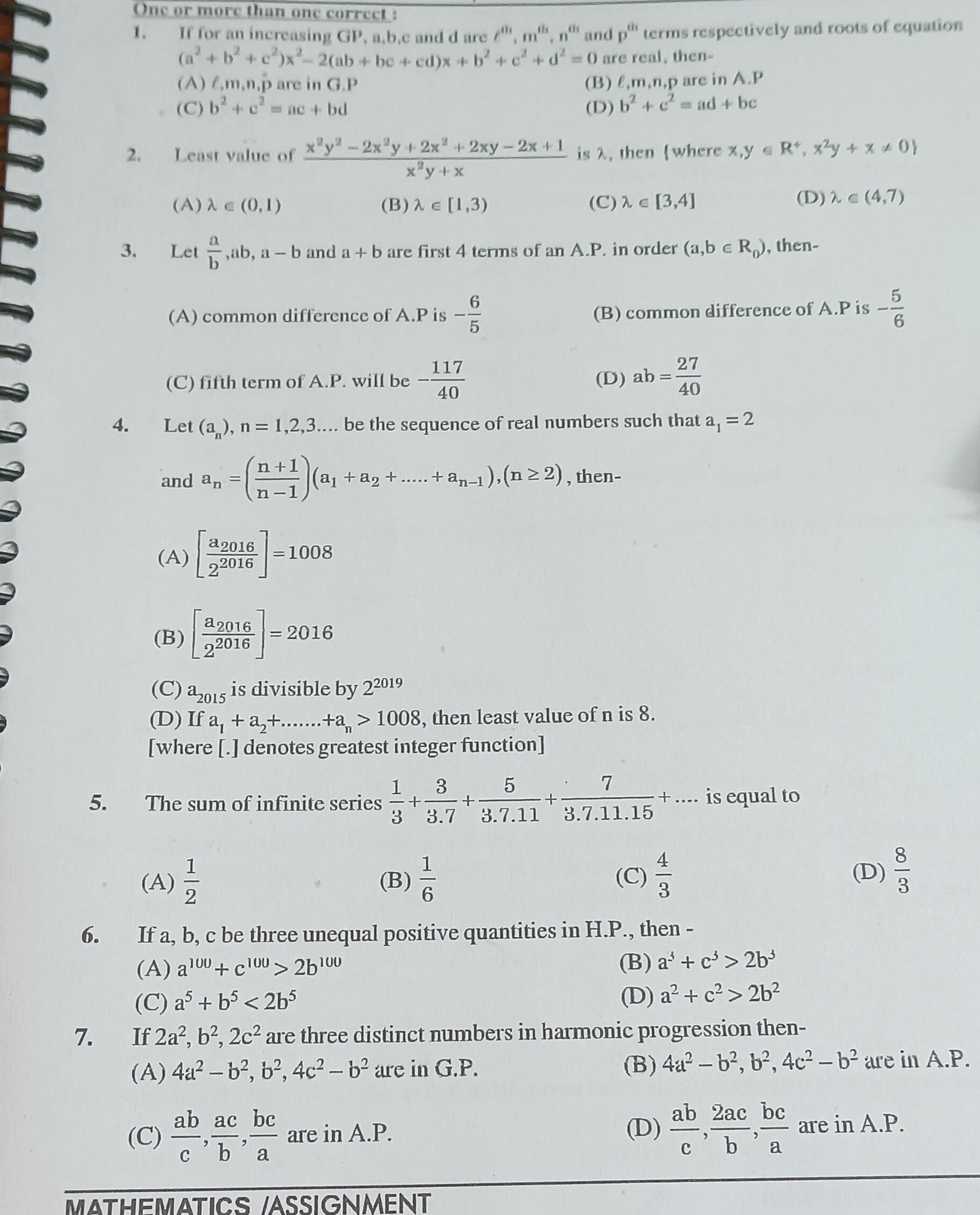Question
Question: One or more than one correct: 1. If for an increasing GP, a,b,c and d are $l^{th}$, $m^{th}$, $n^{...
One or more than one correct:
- If for an increasing GP, a,b,c and d are lth, mth, nth and pth terms respectively and roots of equation (a2+b2+c2)x2−2(ab+bc+cd)x+b2+c2+d2=0 are real, then-
- Least value of x2y+xx2y2−2x2y+2x2+2xy−2x+1 is λ, then {where x,y∈R+, x2y+x=0}
- Let ba,ab,a−b and a + b are first 4 terms of an A.P. in order (a,b∈R0), then-
- Let (an),n=1,2,3.... be the sequence of real numbers such that a1=2 and an=(n−1n+1)(a1+a2+...+an−1),(n≥2), then- [where [.] denotes greatest integer function]
- The sum of infinite series 31+3.73+3.7.115+3.7.11.157+.... is equal to
- If a, b, c be three unequal positive quantities in H.P., then -
- If 2a2,b2,2c2 are three distinct numbers in harmonic progression then-

l,m,n,p are in G.P
λ∈(0,1)
common difference of A.P is −56
[22016a2016]=1008
21
a100+c100>2b100
4a2−b2,b2,4c2−b2 are in G.P.
l,m,n,p are in A.P
λ∈[1,3)
common difference of A.P is −65
[22016a2016]=2016
61
a3+c3>2b3
4a2−b2,b2,4c2−b2 are in A.P.
b2+c2=ac+bd
λ∈[3,4]
fifth term of A.P. will be −40117
a2015 is divisible by 22019
34
a5+b5<2b5
cab,bac,abc are in A.P.
b2+c2=ad+bc
λ∈(4,7)
ab=4027
If a1+a2+.......+an>1008, then least value of n is 8.
38
a2+c2>2b2
cab,b2ac,abc are in A.P.
- (B), (C); 2. (A); 3. (A), (C), (D); 4. (A), (C), (D); 5. (A); 6. (A), (B), (D); 7. (A), (D)
Solution
Explanation for each part:
-
The condition for real roots implies the equality in Cauchy-Schwarz inequality, which means a,b,c,d are in GP. This leads to l,m,n,p being in A.P. (l−m=m−n=n−p). If a,b,c,d are in GP, then b=ar,c=ar2,d=ar3. Substituting these into b2+c2=ac+bd gives a2r2+a2r4=a(ar2)+ar(ar3)=a2r2+a2r4, which is true.
-
The expression simplifies to y+x1−2+xy+12x. Let A=y+x1. The expression becomes A−2+A2. By AM-GM, A+A2≥22. Thus, the minimum value is 22−2≈0.828, which is in (0,1).
-
Let the common difference be d′. d′=(a+b)−(a−b)=2b. Also, d′=(a−b)−ab and d′=ab−a/b. Solving these equations simultaneously yields b=−3/5 (since b=1). Then d′=2(−3/5)=−6/5. a=2b2/(b2−1)=−9/8. ab=(−9/8)(−3/5)=27/40. The fifth term is T5=(a+b)+d′=(−9/8−3/5)+(−6/5)=−69/40−48/40=−117/40.
-
From an=(n−1n+1)Sn−1 and an−1=(n−2n)Sn−2, using Sn−1=Sn−2+an−1, we derive the recurrence an=n2(n+1)an−1 for n≥2. Solving this recurrence with a1=2 gives an=2n−1(n+1).
(A) a2016/22016=22015(2017)/22016=2017/2=1008.5. […]=1008.
(C) a2015=22014(2016)=22014(32⋅63)=22014(25⋅63)=22019⋅63. This is divisible by 22019.
(D) The sum Sn=∑k=1nak=∑k=1n(k+1)2k−1. This is an Arithmetico-Geometric series sum, which evaluates to n⋅2n. We need n⋅2n>1008. 7⋅27=896, 8⋅28=2048. So the least n is 8.
-
The general term is Tn=3⋅7⋅11⋯(4n−1)2n−1. Let Dn=3⋅7⋅11⋯(4n−1). We can write Tn=21(Dn−11−Dn1) by defining D0=1. This is a telescoping series. The sum is 21(D01−limN→∞DN1)=21(1−0)=21.
-
If a,b,c are in H.P., then b=a+c2ac. Since a,b,c are unequal positive quantities, a=c. By Power Mean Inequality, for n≥1, 2an+cn>(2a+c)n. Also, 2a+c>b. Combining these, 2an+cn>bn⟹an+cn>2bn. This holds for n=100,3,2. So (A), (B), (D) are correct. (C) a5+b5<2b5⟹a5<b5⟹a<b, which is not always true.
-
If 2a2,b2,2c2 are in H.P., then 2a21,b21,2c21 are in A.P. This implies b22=2a21+2c21⟹4a2c2=b2(a2+c2).
(A) If 4a2−b2,b2,4c2−b2 are in G.P., then (b2)2=(4a2−b2)(4c2−b2), which simplifies to b2(a2+c2)=4a2c2. This matches the condition. So (A) is correct.
(C) If cab,bac,abc are in A.P., then 2bac=cab+abc⟹2a2c2=b2(a2+c2). This does not match the condition. So (C) is incorrect.
(D) If cab,b2ac,abc are in A.P., then 2(b2ac)=cab+abc⟹4a2c2=b2(a2+c2). This matches the condition. So (D) is correct.
